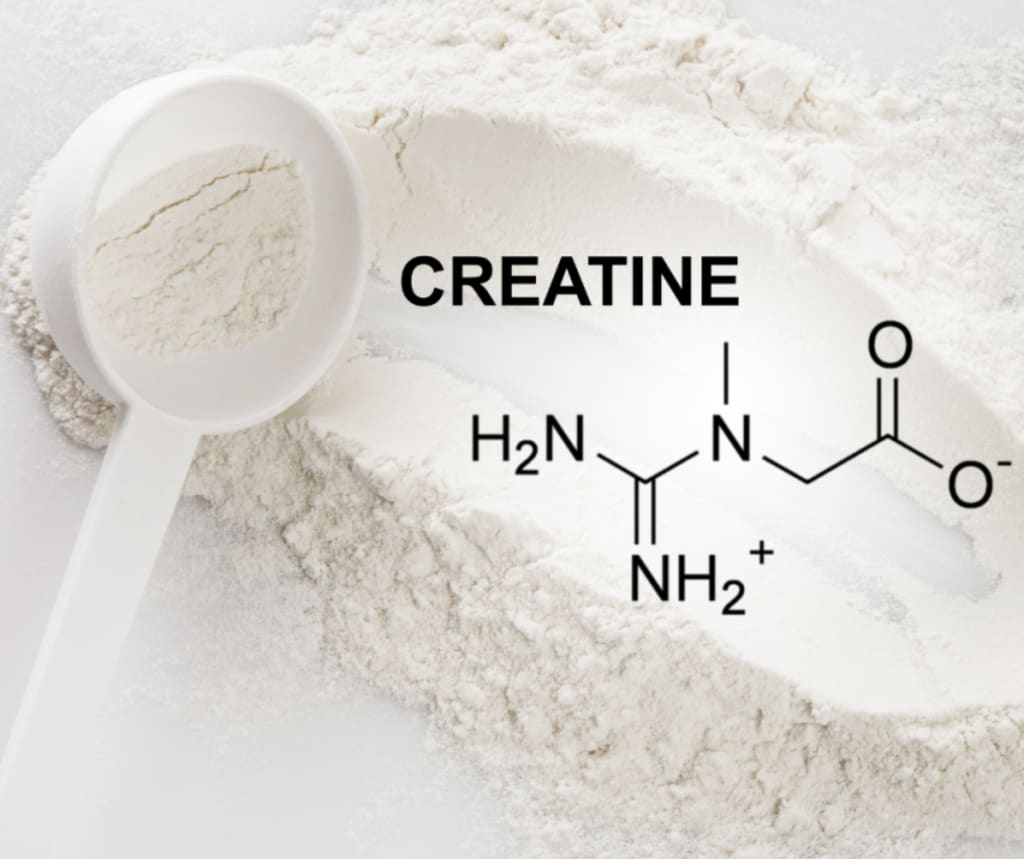CREATINE MONOHYDRATE
Everything You Need to Know About Creatine

Creatine is the top supplement for improving performance in the gym.
Studies show that it can increase muscle mass, strength, and exercise performance (1Trusted Source).
Additionally, it may help lower blood sugar and improve brain function, although more research is needed in these areas.
Some people believe that creatine is unsafe and has many side effects. However, scientific evidence does not support these claims.
In fact, creatine is one of the world’s most tested supplements and has an outstanding safety profile .
This article explains everything you need to know about creatine.
What is creatine?
Creatine is a substance found naturally in muscle cells. It helps your muscles produce energy during heavy lifting or high intensity exercise.
Why use creatine?
Taking creatine as a supplement is very popular among athletes and bodybuilders. They use it to gain muscle, enhance strength, and improve exercise performance.
Chemically speaking, creatine shares many similarities with amino acids, important compounds in the body that help build protein. Your body can produce creatine from the amino acids glycine and arginine.
About half of your body’s creatine stores come from the food you eat — especially red meat and seafood — and the rest is made in your liver and kidneys from amino acids.
Where is creatine phosphate found in the body?
About 95% of the body’s creatine is stored in the muscles, mainly in the form of phosphocreatine. The other 5% is found in the brain and testes.
When you supplement, you increase your stores of phosphocreatine. This is a form of stored energy in the cells. It helps your body produce more of a high energy molecule called ATP.
ATP is often called the body’s energy currency. When you have more ATP, your body can perform better during exercise.
Creatine also alters several cellular processes that lead to increased muscle mass, strength, and recovery.
How does creatine work?
Creatine can improve health and athletic performance in several ways.
In high intensity exercise, its primary role is to increase the phosphocreatine stores in your muscles.
The additional stores can then be used to produce more ATP, which is the key energy source for heavy lifting and high intensity exercise.
Creatine also helps you gain muscle in the following ways:
Boosted workload. It enables more total work or volume in a single training session, a key factor in long-term muscle growth.
Improved cell signaling. It can increase satellite cell signaling, which aids muscle repair and new muscle growth.
Raised anabolic hormones. Studies note a rise in hormones, such as IGF-1, after taking creatine.
Increased cell hydration. Creatine lifts water content within your muscle cells, which causes a cell volumization effect that may play a role in muscle growth.
Reduced protein breakdown. It may increase total muscle mass by reducing muscle breakdown.
Lower myostatin levels. Elevated levels of the protein myostatin can slow or inhibit new muscle growth. Supplementing with creatine can reduce these levels, increasing growth potential.
Creatine supplements also increase phosphocreatine stores in your brain, which may promote brain health and improve symptoms of neurological disease.
How does creatine affect muscle growth?
Creatine is effective for both short- and long-term muscle growth.
It assists many people, including sedentary individuals, older adults, and elite athletes.
One 14-week study in older adults determined that adding creatine to a weight training program significantly increased leg strength and muscle mass.
In a 12-week study in weightlifters, creatine increased muscle fiber growth 2–3 times more than training alone. The increase in total body mass also doubled, alongside one-rep max for bench press, a common strength exercise.
A large review of the most popular supplements selected creatine as the single most effective supplement for adding muscle mass.
Effects on strength and exercise performance
Creatine can also improve strength, power, and high intensity exercise performance.
In one review, adding creatine to a training program increased strength by 8%, weightlifting performance by 14%, and bench press one-rep max by up to 43%, compared with training alone.
In well-trained strength athletes, 28 days of supplementing increased bike-sprinting performance by 15% and bench press performance by 6%.
Creatine also helps maintain strength and training performance while increasing muscle mass during intense overtraining.
These noticeable improvements are primarily caused by your body’s increased capacity to produce ATP.
Normally, ATP becomes depleted after up to 10 seconds of high intensity activity. But because creatine supplements help you produce more ATP, you can maintain optimal performance for a few seconds longer.
About the Creator
Enjoyed the story? Support the Creator.
Subscribe for free to receive all their stories in your feed. You could also pledge your support or give them a one-off tip, letting them know you appreciate their work.






Comments (2)
Thankyou for the information bro 👏👏
Good 👍👍👍